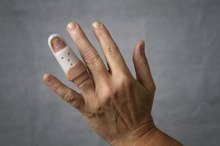What Are the Causes of Bilateral Elbow Pain?
According to MayoClinic.com, elbow pain, including bilateral elbow pain -- simultaneous pain in both elbows -- can be caused by problems with the bones in your elbow joints or the muscles and tendons surrounding your elbows 1. Bilateral elbow pain may also be caused by trauma and certain medical conditions, as well as any condition or injury that damages the network of nerves, blood vessels and ligaments surrounding your elbows 1.
If you are experiencing serious medical symptoms, seek emergency treatment immediately.
Olecranon Bursitis
Olecranon bursitis is a common cause of bilateral elbow pain 12. According to the American Academy of Orthopaedic Surgeons, or AAOS, a bursa -- a fluid-filled sac located between bones and soft tissue -- helps decrease friction between your tissues during movement 2. Your olecranon bursa is located at the tip of your elbow, between the loose skin and the bones of your elbow. In most cases, your olecranon bursa is flat. However, if it becomes irritated or inflamed, a condition known as bursitis can manifest. Possible causes of olecranon bursitis include traumatic injury or prolonged pressure to the tip of the elbow, bacterial infection of the bursa and certain medical conditions. Common symptoms associated with olecranon bursitis include elbow swelling, pain at the back of the elbow and decreased elbow joint active range of motion 1.
Osteoarthritis
How to Crack Your Knuckles Loudly
Learn More
Osteoarthritis, also known as degenerative joint disease, can cause pain in both elbows. The National Institute of Arthritis and Musculoskeletal and Skin Diseases, or NIAMS, states that osteoarthritis is the most common type of arthritis, and is especially common among older individuals 3. Bilateral elbow osteoarthritis occurs when the surface of your elbow joints, which are covered with cartilage, becomes worn or damaged. The most common cause of elbow osteoarthritis is a previous injury, such as a fracture or dislocation. In some individuals, elbow osteoarthritis is caused by age-related joint cartilage degeneration. Although osteoarthritis usually affects your body's weight-bearing joints, such as the hip and the knee, your elbow can be affected too. Common signs associated with osteoarthritis include elbow pain that is worse with elbow movement and decreased elbow joint active range of motion 1.
Fracture
According to the American Society for Surgery of the Hand, or ASSH, elbow fractures are usually caused by falling onto outstretched arms, direct blunt-force trauma to the elbows or elbow twisting injuries 4. In many cases, other injuries -- such as ligament sprains, muscle strains and elbow dislocations -- accompany an elbow fracture. Common symptoms associated with elbow fractures include pain, swelling, bruising, and stiffness in and around your elbows 1. You may hear an audible snap or pop in your elbow or elbows at the time of injury. Other common signs associated with elbow fractures include an inability to straighten your elbow, tenderness when your elbow is touched, numbness in one or more of your fingers and pain when your elbow joints are moved 1. In most cases, your elbow will be temporarily immobilized in a cast or splint following your injury to speed the healing of injured tissues.
Related Articles
References
- Mayo Clinic: Elbow Pain
- American Academy of Orthopaedic Surgeons: Elbow (Olecranon) Bursitis
- National Institute of Arthritis and Musculoskeletal and Skin Diseases: Osteoarthritis of the Elbow
- Vaquero-picado A, Barco R, Antuña SA. Lateral epicondylitis of the elbow. EFORT Open Rev. 2016;1(11):391-397. doi:10.1302/2058-5241.1.000049
- Amin NH, Kumar NS, Schickendantz MS. Medial epicondylitis: evaluation and management. J Am Acad Orthop Surg. 2015;23(6):348-55. doi:10.5435/JAAOS-D-14-00145
- Blackwell JR, Hay BA, Bolt AM, Hay SM. Olecranon bursitis: a systematic overview. Shoulder Elbow. 2014;6(3):182-90. doi:10.1177/1758573214532787
- Truong J, Ashurst JV. Septic Bursitis. Treasure Island, Fl: StatPearls Publishing; 2019.
- Varacallo M, Mair SD. Proximal Biceps Tendinitis and Tendinopathy. Treasure Island, Fl: StatPearls Publishing; 2019.
- Bellapianta JM, Lavelle WF, Lavelle ED, Onyedika I, Economedes D, Whipple R. Hand Pain. Current Therapy in Pain. 2009:156-167. doi:10.1016/b978-1-4160-4836-7.00021-3
- Moradi A, Ebrahimzadeh MH, Jupiter JB. Radial Tunnel Syndrome, Diagnostic and Treatment Dilemma. Arch Bone Jt Surg. 2015;3(3):156-62.
- Saeed W, Waseem M. Elbow Fractures Overview. Treasure Island, Fl: StatPearls Publishing; 2019.
- Athwal GS. Elbow Dislocation - OrthoInfo - AAOS. OrthoInfo: American Academy of Orthopaedic Surgeons. Oct 2017.
- Bursitis. MedlinePlus. Sept 12, 2019.
- Harvard Health Publishing. The importance of stretching. Harvard Health. Sept 2013.
- Tennis Elbow (Lateral Epicondylitis) - OrthoInfo - AAOS. OrthoInfo: American Academy of Orthopaedic Surgeons. Jul 2015.
- Shah CM, Calfee RP, Gelberman RH, Goldfarb CA. Outcomes of rigid night splinting and activity modification in the treatment of cubital tunnel syndrome. J Hand Surg Am. 2013;38(6):1125-1130.e1. doi:10.1016/j.jhsa.2013.02.039
- Biceps Tendinitis - OrthoInfo - AAOS. OrthoInfo: American Academy of Orthopaedic Surgeons. Feb 2016.
- Kinaci A, Neuhaus V, Ring D. Surgical procedures of the elbow: a nationwide cross-sectional observational study in the United States. Arch Bone Jt Surg. 2015;3(1):13-8.
- American Academy of Orthopedic Surgeons. (n.d.). Elbow Arthroscopy.
- Kane SF. Evaluation of Elbow Pain in Adults. Am Fam Physician. 2014 Apr 15;89(8):649-57.
- O'Connor FG. (2018). Evaluation of elbow pain in adults. Fields KB, ed. UpToDate. Waltham, MA: UpToDate Inc.
- Sources:American Academy of Orthopedic Surgeons (n.d.). Elbow Fractures in Children.
Writer Bio
Martin Hughes is a chiropractic physician, health writer and the co-owner of a website devoted to natural footgear. He writes about health, fitness, diet and lifestyle. Hughes earned his Bachelor of Science in kinesiology at the University of Waterloo and his doctoral degree from Western States Chiropractic College in Portland, Ore.









